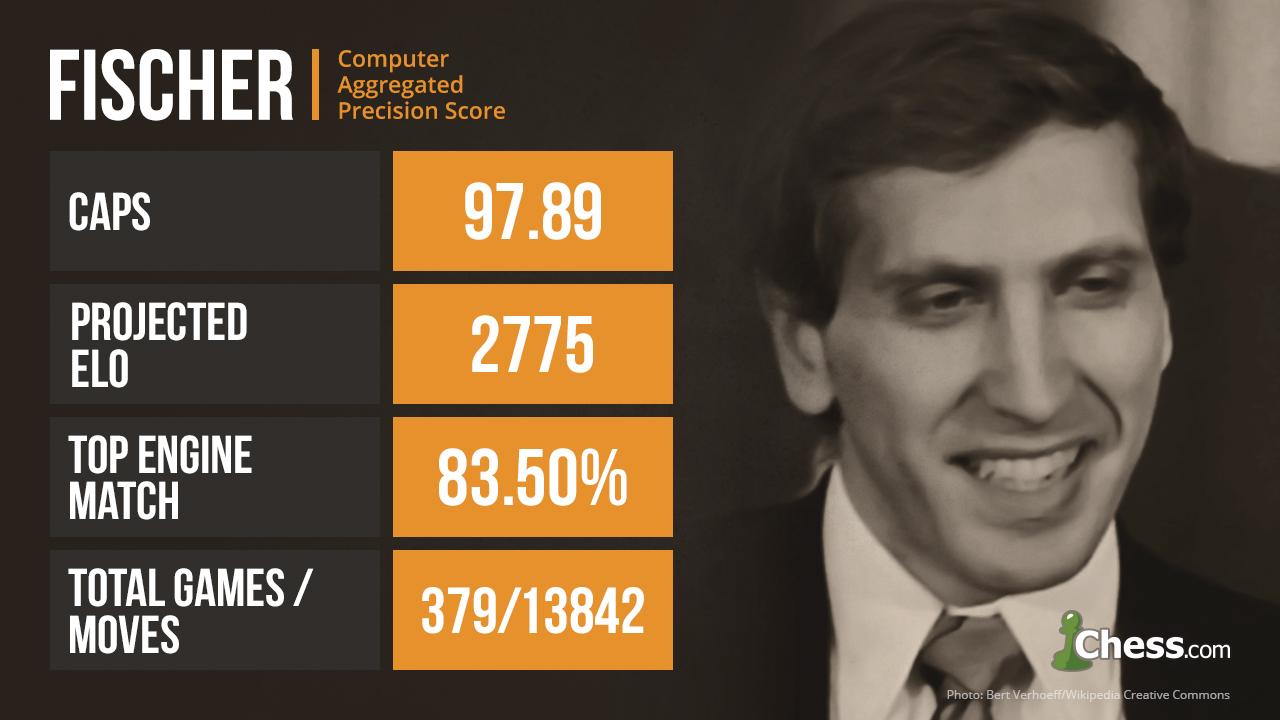
Who Was The Best World Chess Champion In History?
What if we had a time machine? What if we could bring all the greatest chess players in history together, removing any advantages of opening theory or other evolved knowledge of our game for a super-tournament?
What if Fischer played Kasparov? Kramnik played Alekhine? Carlsen played Morphy?
This long-asked, yet virtually impossible-to-answer question might finally have a starting point. Of course, without the invention of a time-travel device, the true answer to this question will forever remain a mystery, but with Chess.com's CAPS, we may at least have a yardstick capable of comparing all players to the same standard.
How does that list break down?

Of course, when we first published our (controversial?) form of measuring accuracy, critics suggested it was flawed because it didn't consider practical factors of style, psychology and strength of opposition. While rating points are awarded for your victory against another opponent, CAPS is an abstract evaluation given to a comparison against a machine.
While the machine may play "perfectly" when compared to humans, it is still a machine and not an opponent. And indeed, if your preferred tools of measurement for a player's strength remain one of the three I listed above, then you may view our article as yet another abstract stab at providing a number for something that is intangible.

Another way to look at CAPS is with the same points taken into account, yet viewed from the opposite perspective. CAPS removes all abstract and non-measurable features of evaluating a chess game or player's strength.
Exactly!
It removes style, psychology, and strength of opposition as factors that falsely affect the true evaluation of how well a person played. Further, if ratings and titles remain the only yardstick by which these great champions are measured, then we forever remain in the dark regarding how well they played. Why?
There is no way anyone in their right mind would argue that Morphy, Steinitz and Lasker faced the same level of competition as Botvinnik, Tal and Spassky, let alone Kasparov, Kramnik and Anand. In addition, ratings and titles did not exist in the organized fashion they do today until the 1960s-70s.

How can we compare the rating of a modern-day world champion to those who played during an era when the Elo system didn't even exist? And even for all those champions who did play during a time of rating measurements, how can you possibly compare a peak rating achieved by Fischer to a rating achieved by Carlsen where, in the modern era, Carlsen has higher-rated players to compete against, and therefore can achieve a higher rating than Fischer ever could (again, if we use FIDE's Elo system as the tool)?
Maybe that theory isn't even fair to Carlsen. During some of his most impressive streaks, could he perhaps have crossed 2900 if his opponents had higher ratings? We simply do not know!

Anand: ranked 5th all time in terms of accuracy by a World Champion according to CAPS
But with CAPS we are at least able to remove the noise and focus in on a singular point of information, comparing all players to the same standard and asking the question: Who played the most like the "chess gods" we know and worship today, e.g. Stockfish, Komodo and Houdini?
Could we then use that tool to project an Elo based on the accuracy achieved as compared to both the engines and to the other players?
Why yes, yes we can. And the results are super interesting and fun to discuss.

So why did Kramnik achieve a higher overall CAPS score than Kasparov, despite the fact that Kasparov is considered by all chess lore to have had a more legendary career? Is it perhaps because Kramnik had a better head-to-head score against Garry the Great? Is it because he had, by all our human measurements, a more "old, positional style, taking less aggressive risks than Kasparov did?"
Or is it perhaps because he was, dare I say it, better than Kasparov? ![]()

A smooth, positional style earned Kramnik a win in this world championship final game against Leko.

Kasparov's style may not have been as accurate as Kramnik's, but wow, was it fun!
And what about two legends of the game with contrasting styles? Take a look at the score between Capablanca and Alekhine. Those numbers might surprise many Alekhine fans! But the proof is in the pudding.

Capablanca wove positional circles around his competition.
Some chess lovers may dislike our findings and evaluations of the quality of play of our forefathers, but again, we see that not only were they facing a lower level of competition (based on the human reasoning that chess is improving over the years), but that even against those levels of inaccurate, blunderful ![]() play, they still played a less accurate style of chess.
play, they still played a less accurate style of chess.
What's going on here? Could this really be? *Mind-being-blown.*
We have to ask whether Chess.com is truly confident enough to believe that its CAPS system might be better than Elo ratings.

Well, first I'd have to answer that point by asking a question: Are we really the first ones to try for a different form of measurement than FIDE's Elo system? Of course not! There are many national organizations with slightly different algorithms than FIDE's Elo system. And recent news tells us that even other leaders of the free chess world believe there may be better ways to find a player's overall strength, cross-time-control.
I will say that despite the question asked in our announcement of CAPS (is it better than ratings?), we do not actually claim it to be better. Just different. It's a standard that asks a more personal question: How well did you play? The single player. Regardless of strength of opposition. Regardless of the results. Regardless of the rating points gained.
Ratings are a must. You must be rewarded for your wins, punished for your losses, and held accountable for your draws. But do they tell the whole story? And are ratings always that easy to understand?
Is it not hard to explain to your grandmother why someone who achieved a 2880+ rating is the best of all time? What does that number mean? Is rating inflation a real issue?

However, you could argue that telling someone you scored 76 percent in this game is pretty easy to understand immediately, based on a culture that assumes (correctly) that 100 percent is perfect.
Of course, Chess.com is aware of the limitations! The reveal of a "CAPS II" is coming soon, along with a tool that allows members to measure their own games with CAPS!
The next stage will take even more in-depth looks into a player's history. It will allow us to more accurately evaluate certain segments of a game such as accuracy with a particular piece (fun, right? ![]() ) and who played the most accurate single game of all time. What can we do to evaluate a finer set of data? Maybe we can consider only the top 20 games by each world champion, removing any potential advantages or disadvantages for players who have played more games and have more moves for us to review.
) and who played the most accurate single game of all time. What can we do to evaluate a finer set of data? Maybe we can consider only the top 20 games by each world champion, removing any potential advantages or disadvantages for players who have played more games and have more moves for us to review.
Wait, by saying that, am I not admitting that our current claims could possibly be improved (and flawed)? Well, first, I'd say that Chess.com would never claim to be perfect. At anything. But that which is unattainable should still be pursued.
Further, improvements will not change the way we measure the advantages of CAPS: All players will again be compared to the same set of improvements. The yardstick will get better, but the evaluation and point for comparison will always stay the same for all players.


This allows the measurement and CAPS comparison to truly transcend the chess timeline. Yes, we will learn more. Perhaps those with very close CAPS scores (like Smyslov and Spassky) will see a flip in their rankings, but overall, with the measurements only revealing more truth, we can only become less ignorant about the true strength of play by our greatest champions.
I offer you the same decision Morpheus once offered Neo. Take the blue pill, and all this goes away. Chess strength is not increasing over time, and Morphy is fully a match for Carlsen.

Or you can take the red pill. The red pill uncovers a whole new world of scientific research. This research opens the reader to a world in which we face the reality of just how good our game has become, and how hard—and amazing—it is for the players of the modern era to play against others who are also preparing deeply with machines.
Our modern champions have, in essence, learned to play more accurately. More precisely. More like machines. More like gods.
And though we by no means can ever deny the greatness of those who came before us, by taking the red pill of CAPS, we must acknowledge the truth: The champions of the past did what they had to do to win against the players of their era, yet the flaws in their game are undeniable.

Will we look at Carlsen one day in the same light we now see Euwe, Karpov or Botvinnik?
As a player who, for all his achievements, missed opportunities that the machines later revealed, and that his surpassers were able to understand and find?
One must ask where Carlsen's opponents go wrong.









